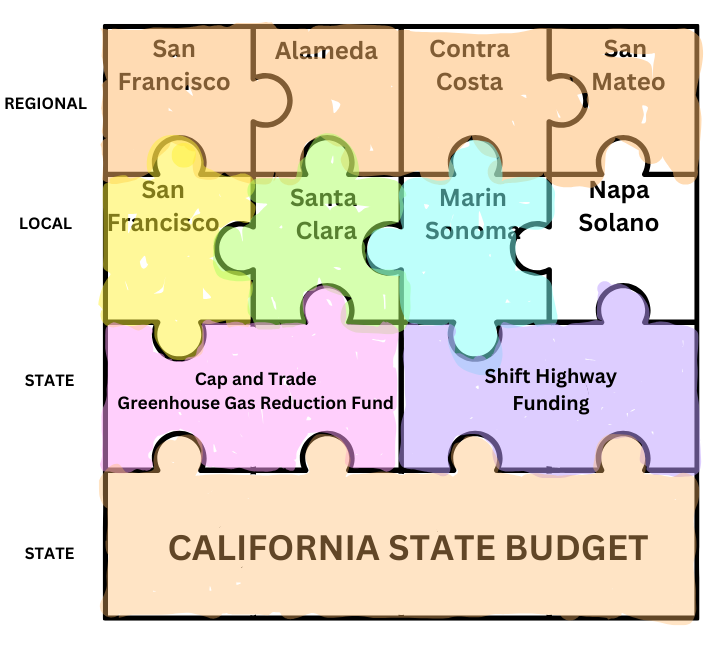Last week, Senators Wiener and Arreguin announced a new bill, SB63 that would authorize a regional public transportation funding measure. The first draft of the bill calls for a half-percent sales tax that would fund the regional transit agencies that face likely cuts, including Caltrain, BART, Muni and AC Transit. The proposed measure includes San Francisco, Alameda and Contra Costa counties, and allows San Mateo and Santa Clara Counties to opt in by July 31.
How many counties?
San Mateo County and Santa Clara Counties are conducting polling to assess the benefits of participating in a regional measure, or doing a separate measure and participating “side by side” with local contributions to Caltrain, BART, and regional transit coordination.
What sort and amount of tax?
The bill proposes a half-percent sales tax, with an option for a higher sales tax in San Francisco up to one percent. A four-county variant would raise about $540Million according to earlier MTC analysis. There is a new poll in the field that is testing several other, more progressive funding source options including a payroll tax, a gross receipts tax, and a hybrid sales and gross receipts tax, all raising $800M in revenue.
Regional transit coordination
SB 63 would use up to 10% of its funding and require commitments to participate in transit transformation initiatives such as free transfers and coordinated paratransit, as spelled out in the 2021 Bay Area Transit Transformation Action Plan, and follow-up plans that will be developed to continue transit coordination.
Expenditure plan
The expenditure plan will be developed by a “Transit Operations Financial Responsibility and Implementation Plan” that outlines target contributions to transit operators with major financial operating needs (BART, Muni, Caltrain, AC Transit). The funding for BART will be informed by an independent analysis in the works to inform San Mateo County’s contribution to BART, and the funding for Caltrain would be determined in discussions among the three county partners on the Caltrain Joint Powers Authority (San Francisco, San Mateo, Santa Clara).
Efficiency analysis
If the ballot measure passes, the bill calls for a “a comprehensive independent third party financial efficiency review of the operations of BART, Muni, Caltrain, and AC Transit, to make recommendations for cost-saving measures, differentiating measures that do not reduce levels of service.
Citizens’ Initiative
The bill authorizes an option for the measure to be put on the ballot by a citizen signature gathering initiative. This approach would allow the measure to pass by 50%+1 vote, rather than the two thirds that would be required if a government entity put the measure on the ballot. As to why the bill is needed, there doesn’t exist an entity that can collect funding from multiple counties for transportation. That would need to be created by legislation before a citizens’ initiative could authorize the tax.
Encouraging a regional approach
The Voices for Public Transportation Coalition is holding off from supporting the bill, awaiting polling results that will have important information about the chances of success of a regional measure with more counties, and more progressive funding mechanisms.
To make sure that Bay Area transit keeps running and improving will require a combination of state, regional, and local funding. Whether agencies and counties participate in a regional measure, or conduct a separate local measure, it is essential for them to commit to fund Caltrain and BART as these agencies serve multiple counties. We also need our transit board representatives to commit to continued transit coordination, such as free transfers, coordinated signs and paratransit, so riders have an easier time getting where they need to go.

